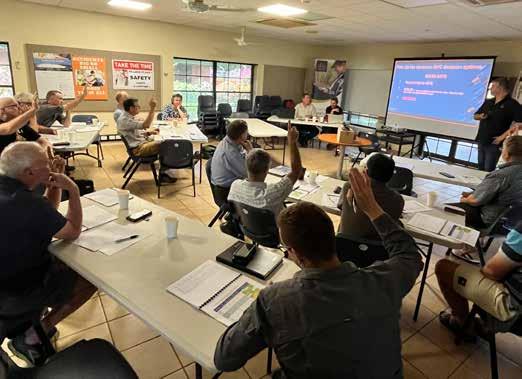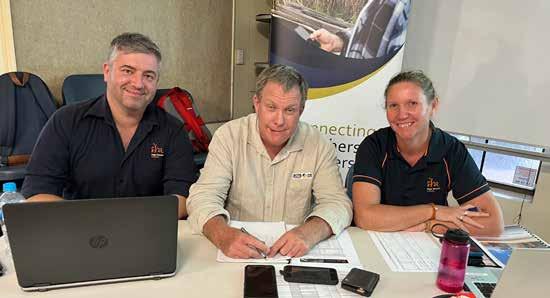
3 minute read
GUIDING THE UPTAKE OF NEWLY RELEASED VARIETIES
New cane varieties form the foundation of SRA’s work to improve the productivity, sustainability and competitiveness of Australia’s sugarcane industry.
The SRA breeding program identifies and selects parents for crossing with traits that will enhance the progeny performance for a district’s challenges. These parents come from the vast SRA germplasm collection of experimental clones, old and current varieties, as well as wild and foreign varieties.
Advertisement
“The parent mix is actively managed and is at an important stage of development,” says SRA Executive Manager Variety Development, Jason Eglinton.
“The offspring of varieties such as Q253 A are beginning to feature in the advanced candidates being considered for release and the early performance of SRA9 A and SRA26 A as parents suggests the pipeline of future varieties is getting stronger.”
A rigorous selection process
SRA plants around 100,000 new seedlings annually as potential varieties for the future. It then takes between 10 and 12 years for evaluation of the target traits and performance evaluation across crop classes and environments to produce the information required to consider the commercial potential of the small number of candidates that survive the selection process.
Approval for release
Every year new varieties are assessed for their suitability for local release by six Regional Variety Committees (RVCs). Each committee comprises voting members from the local grower representative organisations and milling companies, and release decisions require a unanimous vote. The committees are also supported by individual growers (particularly those that host SRA trials), technical staff from milling companies, private agronomists, productivity service organisations, and SRA staff.
At an annual RVC meeting, held early in the year, each committee is presented with detailed data from new candidates compared to the relevant commercial varieties of the region. The commercial merit of candidate varieties is considered against the local production constraints and challenges, as well as the strengths and weaknesses of the current variety mix.
Productivity is king so yield and CCS across crop classes and trial locations is a key focus. The weighting of TCH and CCS reflects the whole of industry relative economic value (rEGV) which is region specific and based on the local drivers of cost and profit. Other characteristics that affect the agronomic fit of varieties are also considered including lodging, arrowing, suckering, side shooting, germination behaviour, and early vigour.
Screened for disease resistance
Experimental clones advancing through the selection program are also screened for disease resistance to smut, Fiji leaf gall, leaf scald, mosaic and red rot, this is carried out at SRA’s Woodford station; yellow spot, brown rust and orange rust at SRA’s Meringa station; and Pachymetra root rot at SRA’s Tully station. This means disease ratings are available before commercialisation decisions are made.
Approved varieties
The RVCs also have a formal responsibility under the Sugarcane Industry Biosecurity Committee to maintain minimum disease standards. Once a variety is released it is added to the Approved variety list for the region. Importantly the use of an Approved variety is seen as meeting one aspect of every grower’s General Biosecurity Obligation under the Queensland Biosecurity Act (2014). Cane supply agreements also commonly reference delivery of only Approved varieties.
Understanding what’s best for your farm
Maximising profitability and minimising risk by adopting a balanced mix of varieties across a farm with different productivity constraints, disease pressures, and harvest timing can be a complex task. Good decision-making in variety adoption and management relies on good information about variety characteristics and performance.
Each year SRA publish Variety Guides for each region summarising productivity data, disease resistance profiles, agronomic characteristics, herbicide toxicity information, and increasingly maturity curves to support selection of varieties to propagate and evaluate on your farm.
Guides for the 2023/24 season for the Northern, Herbert and Burdekin districts are now available to download from SRA’s website; and have been mailed to all levy payers in these districts. Variety Guides for the 2023/24 season for the Central, Southern and NSW districts will be available online, and mailed to all levy payers in those districts in the coming weeks.
Accessing new varieties
With new varieties continually entering the industry it is important that growers can access clean planting material. There are several ways to access released varieties and it is important that this is done in a way that doesn’t introduce new diseases to a farm. Clean cane can be easily sourced through local productivity service organisations and SRA’s tissue culture program.
For more information on tissue culture contact:
SRA Tissue Culture Manager Clair Bolton
E cbolton@sugarresearch.com.au T 07 3331 3374
QCANESelect™
The web-based variety information tool QCANESelect™ was launched in 2008 and has provided variety performance information based on anonymised commercial productivity data provided by milling companies. The software platform for QCANESelect™ is no longer supported and cannot be maintained. A new reporting tool that will allow interrogation performance information from SRA trials as well as commercial production data is currently under development.
After consultation with RVC’s in all districts SRA has deactivated QCANESelect™. Growers, millers and productivity services are now encouraged to go directly to the Varieties page on the SRA website to access the annually produced Variety Guide for their district and additional Fact Sheets and performance information.

sugarresearch.com.au/growers-and-millers/varieties/
If you have any questions about SRA’s varieties please contact your District Variety Officer:
SRA Northern Variety Officer Andrew Rigby
E: arigby@sugarresearch.com.au
SRA Herbert Variety Officer Juan Briceno
E: jbriceno@sugarresearch.com.au
SRA Burdekin Variety Officer Catherine Kettle
E: ckettle@sugarresearch.com.au
SRA Central Variety Officer Christopher Tom
E: ctom@sugarresearch.com.au
SRA Southern Variety Officer Clare Hogan
E: chogan@sugarresearch.com.au
SRA New South Wales Variety Officer Anthony Cattle
E: acattle@sugarresearch.com.au








